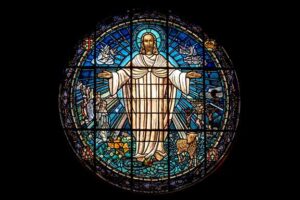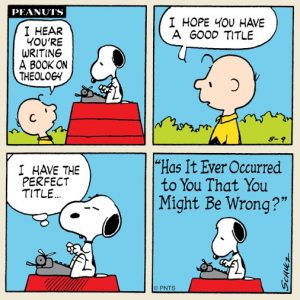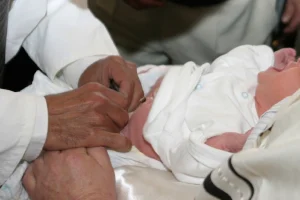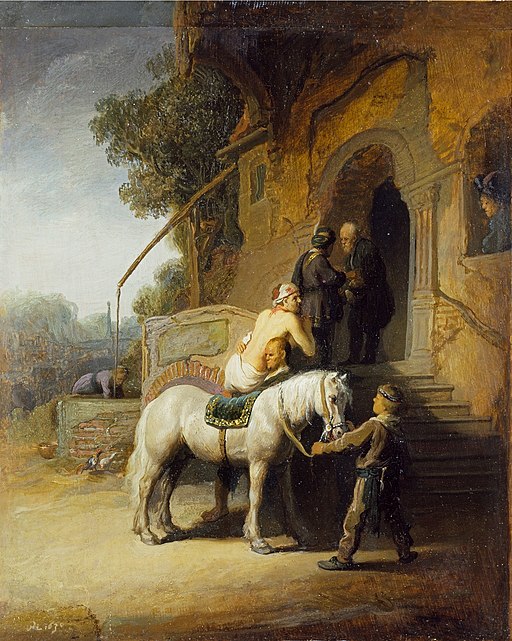 What are we to do with our first lesson today? The story of the testing of Abraham and the binding of Isaac, called the Akedah in Hebrew, “exudes darkness and mystery, and it brings before us a thousand questions, most of which have no answers.”[1] In the late 1300s an unknown English author penned a short treatise entitled The Cloud of Unknowing basically arguing that such “darkness and mystery,” and the thousands of unanswerable questions they bring, are really fundamental to our relationship with God. “[O]f God Himself can no man think,” he writes, “He may well be loved, but not thought. By love may He be gotten and holden; but by thought never.”[2]
What are we to do with our first lesson today? The story of the testing of Abraham and the binding of Isaac, called the Akedah in Hebrew, “exudes darkness and mystery, and it brings before us a thousand questions, most of which have no answers.”[1] In the late 1300s an unknown English author penned a short treatise entitled The Cloud of Unknowing basically arguing that such “darkness and mystery,” and the thousands of unanswerable questions they bring, are really fundamental to our relationship with God. “[O]f God Himself can no man think,” he writes, “He may well be loved, but not thought. By love may He be gotten and holden; but by thought never.”[2]
The Spanish mystical poet, St. John of the Cross, made a similar point in his poem known as The Dark Night of the Soul. He wrote in the first verse:
Once in the dark of night,?
Inflamed with love and yearning, I arose?
(O coming of delight!)?
And went, as no one knows,
?When all my house lay long in deep repose….[3]
“In this first stanza,” John himself said, the soul relates the way and manner which it followed “to attain to living the sweet and delectable life of love with God; and it says that this going forth from itself and from all things was a ‘dark night,’ by which . . . is here understood purgative contemplation.”[4] This “purgative contemplation” has been called a darkening of the will, intellect, and senses,[5] or more simply a “remain[ing] silent, …not thinking of anything.”[6]
 Do any of you know the story of Tubby the Cocker Spaniel? Well . . . remember Tubby’s name. We’ll come back to him, but first let’s put today’s gospel lesson in perspective.
Do any of you know the story of Tubby the Cocker Spaniel? Well . . . remember Tubby’s name. We’ll come back to him, but first let’s put today’s gospel lesson in perspective. Our gospel lesson is the shortened version of Jesus’ commission to the twelve as he sends them out to do missionary work. As he continues with their instructions he tells them, “I am sending you out like sheep into the midst of wolves; so be wise as serpents and innocent as doves,”
Our gospel lesson is the shortened version of Jesus’ commission to the twelve as he sends them out to do missionary work. As he continues with their instructions he tells them, “I am sending you out like sheep into the midst of wolves; so be wise as serpents and innocent as doves,” “As Jesus was walking along, he saw a man called Matthew sitting at the tax booth; and he said to him, ‘Follow me.’ And he got up and followed him.”
“As Jesus was walking along, he saw a man called Matthew sitting at the tax booth; and he said to him, ‘Follow me.’ And he got up and followed him.” It’s the last Sunday of the Christian year, sort of a New Year’s Eve for the church. We call it “the Feast of Christ the King” and we celebrate it by remembering his enthronement. Each year on Christ the King Sunday we read some part of the crucifixion story. As Pope Francis reminded the faithful in his Palm Sunday homily a few years ago, “It is precisely here that his kingship shines forth in godly fashion: his royal throne is the wood of the Cross!”
It’s the last Sunday of the Christian year, sort of a New Year’s Eve for the church. We call it “the Feast of Christ the King” and we celebrate it by remembering his enthronement. Each year on Christ the King Sunday we read some part of the crucifixion story. As Pope Francis reminded the faithful in his Palm Sunday homily a few years ago, “It is precisely here that his kingship shines forth in godly fashion: his royal throne is the wood of the Cross!”


 When I was in the 8th Grade, I attended Robert Fulton Junior High School in Van Nuys, California, which is in the San Fernando Valley area of the Los Angeles metroplex. At some point during the year, Mrs. R. Smith, who taught English, gave my class an assignment to memorize and interpret a poem; we had to get up in front of the class, recite the poem, and then give our interpretation. When it came to be my turn, I recited my chosen poem, said what I believed it meant, and explained my interpretation. Mrs. Smith responded, “Your interpretation is wrong,” to which I replied, “I can interpret a poem any damned way I please!”
When I was in the 8th Grade, I attended Robert Fulton Junior High School in Van Nuys, California, which is in the San Fernando Valley area of the Los Angeles metroplex. At some point during the year, Mrs. R. Smith, who taught English, gave my class an assignment to memorize and interpret a poem; we had to get up in front of the class, recite the poem, and then give our interpretation. When it came to be my turn, I recited my chosen poem, said what I believed it meant, and explained my interpretation. Mrs. Smith responded, “Your interpretation is wrong,” to which I replied, “I can interpret a poem any damned way I please!”

